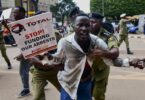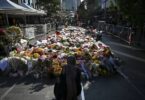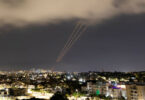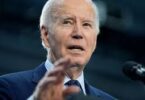Richard Goldberg
The U.N.’s nuclear chief on Monday all but accused Iran of lying to international inspectors about the existence of undeclared nuclear material and sites inside the country—an alarming development in an investigation that predates America’s withdrawal from the Iran nuclear deal. The statement raises an important question for the Biden administration: Will Iran be required to account for its past and present clandestine nuclear work before President Joe Biden agrees to lift U.S. sanctions? If the answer is no, Biden will be repeating the mistakes of the past—rewarding Iranian nuclear deception, shredding the integrity of the global nonproliferation regime, and guaranteeing Iran continues its long-term pursuit of nuclear weapons.
Iran, a party to the Nuclear Non-Proliferation Treaty (NPT), has a long track record of willfully concealing its nuclear activities in violation of its treaty obligations. In late 2002, an Iranian dissident group revealed the existence of a secret uranium enrichment facility at Natanz and a heavy water facility at Arak. In 2009, the Obama administration exposed another secret enrichment facility buried deep underground near the city of Qom. In both cases, Iran declared its nuclear activities to the International Atomic Energy Agency (IAEA) only after getting caught. The regime’s nuclear modus operandi is simple: Conceal unless and until exposed.
The 2015 nuclear agreement—formally known as the Joint Comprehensive Plan of Action or JCPOA—nominally required Iran to open up about its past work on nuclear weapons. The deal stipulated that sanctions relief and other key benefits would not be forthcoming until Iran allowed IAEA inspectors to pursue leads indicating Iran sought not only to enrich uranium, but to build an actual nuclear weapon.
Iran agreed, understanding that Obama and his European partners would declare the issue settled regardless of whether Iran allowed a serious investigation. Unsurprisingly, the IAEA reported “ambiguities” in the answers Iran submitted and its inspectors were prevented from visiting a suspected nuclear weapons site until Tehran finished cleaning it up. Regardless, America lifted sanctions, giving Iran access to tens of billions of dollars, and the U.N. Security Council ended its prohibition on Iran’s enrichment of uranium. Iran had ostensibly come into compliance with the NPT and abandoned its quest for nuclear weapons—or so we thought.
In early 2018, while the United States remained a participant in the JCPOA, Israel’s Mossad intelligence service infiltrated a storage facility near Tehran and removed a secret nuclear weapons archive Iran had concealed from the IAEA. Academics who have seen parts of the archive describe it as a breathtaking curation of Iran’s work to build nuclear weapons. The regime meticulously logged its every move—and it archived those moves for a reason.
In September 2018, Israeli Prime Minister Benjamin Netanyahu revealed the existence of a “secret atomic warehouse for storing massive amounts of equipment and materiel from Iran’s secret nuclear program.” Commercial satellite imagery of the site in the Turquzabad district of Tehran showed Iran moving containers and later sanitizing the site. The following year, the IAEA inspected the site and found traces of undeclared nuclear material, indicating continued violation of the NPT.
Also in 2019, the U.S. Treasury and State Departments revealed that the founder of Iran’s nuclear weapons program—the late Mohsen Fakhrizadeh, who was assassinated last year in Iran—had led a secret Iranian military group, the Organization of Defensive Innovation and Research or SPND, which employed Iranian nuclear weapon scientists. Layered atop the existence of the nuclear archive and possible undeclared nuclear activities, the full extent of Iranian nuclear deception was slowly coming into focus.
IAEA Director General Rafael Grossi brought that picture into sharp relief this week by announcing the agency had inspected three more sites that had never been declared to the agency and found traces of nuclear material at two of them. These sites may be connected to another reported secret Iranian nuclear site at Abadeh, which Netanyahu exposed in a September 2019 press conference. As for questions surrounding the Turquzabad site, Grossi said the IAEA was “deeply concerned that undeclared nuclear material may have been present at this undeclared location and that such nuclear material remains unreported by Iran.”
These revelations undermine the very core of the JCPOA and will pose serious challenges to any attempt to resurrect the agreement. First, it’s clear now that Iran deceived the IAEA in 2015 and never provided a complete or truthful accounting of its undeclared nuclear activities. The Obama administration pressed forward with the nuclear deal despite obvious red flags that Iran was still covering up its true nuclear ambitions. Giving Iran a free pass on nuclear deception led only to more deception. The Biden administration should not repeat the mistakes of the past by rejoining the pact and lifting U.S. sanctions before Iran comes clean.
Second, critical deficiencies in the JCPOA’s inspection regime are on full display. The IAEA didn’t seem to know Iran was hiding a nuclear archive until the Mossad announced it had stolen it. Nor did the agency seem to have any idea Iran had a secret warehouse or other undeclared sites where nuclear material had been stored until they were exposed by the prime minister of Israel. Most concerning, Iran keeps its military facilities off-limits to IAEA inspections—leaving a gaping hole in its verification regime. SPND, of course, is a military organization.
Third, the IAEA is pulling on a thread that opened while America remained a participant in the JCPOA. Unlike other nuclear misconduct topping the news, including the enrichment of uranium, Iran’s nuclear deceit is not a response to U.S. withdrawal from the deal or imposition of sanctions—it is a fundamental breach of its nuclear obligations and commitments, including the NPT.
President Biden’s stated condition for the United States to rejoin the JCPOA is for Iran to first return to “strict compliance” with the deal. Since the deal was premised on Iran abandoning its nuclear weapons ambitions and coming clean to the IAEA about its clandestine nuclear activities, the Biden administration must demand Iran fully account for all undeclared nuclear activities, sites and materials prior to rejoining the agreement and lifting sanctions. Otherwise, the president will be hard-pressed to explain the U.S. national security interest in a nuclear deal that pays Iran billions of dollars to keep its nuclear weapons-related activities secret.
Defenders of the JCPOA argue that the nuclear archive is historical in nature rather than a current nuclear threat. The JCPOA, by contrast, deals with the threat in front of us: Iran’s enrichment. Don’t create an unnecessary hurdle to resolving the threat in front of us with questions about the past, they will say.
But Iran’s failure to disclose nuclear sites and materials is not about history—it’s about an active breach of the NPT, which the IAEA was unable to detect using the JCPOA’s verification regime.
Papering over Iran’s breach of its most fundamental nuclear obligations in favor of the empty reassurances provided by a flawed nuclear agreement would be an enormous strategic mistake—not just for the new administration’s Iran policy but for other regimes watching across the world. To reward Iran with sanctions relief for concealing undeclared nuclear material and activities poses a far greater threat to the global nonproliferation regime than withdrawal from flawed agreements.
Richard Goldberg is a senior adviser at the Foundation for Defense of Democracies. He served on Capitol Hill, on the U.S. National Security Council, as the governor of Illinois’s chief of staff, and as a Navy Reserve Intelligence Officer. Follow him on Twitter @rich_goldberg. FDD is a Washington, DC-based, nonpartisan research institute focusing on national security and foreign policy.
Courtesy: (FDD)






